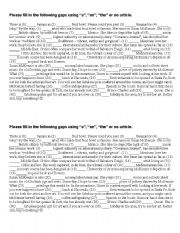
|
Article Exercise
Article Exercise Key
1. a – first mention of a singular object starting with a consonant
2. the -- Use “the†when both the speaker and listener know what is being talked about, even if it has not been mentioned before: “ Where´s the bathroom?â€, “ It´s just down the hall.â€
3. the – second mention of object
4. the – see rule 2
5. the -- Use “the†in sentences or clauses where we identify a specific person or object:
The woman who painted this picture is famous.
“ Which shirt did you choose?†“The blue one.â€
“ My car is the one parked in front.â€
6. indefinite article -- with nationalities and religions:
John is an Englishman.
Kate is a Catholic.
7. no article – names of most countries
8. the -- 4. Use “the†to refer to things that are unique:
the sun, the moon, the world
9. the -- Use “the†before superlatives and ordinal numbers:
the highest mountain, the smallest child
the first page, the third book, the last chapter.
10. the -- Use “the†with names of geographical areas and with oceans:
Examples: the Caribbean, the Middle East, the Pacific, the Atlantic names of rivers, oceans and seas: the Nile, the Pacific, points on the globe: the Equator, the North Pole, geographical areas: the Middle East, the West, deserts, forests, gulfs, and peninsulas: the Sahara, the Persian Gulf, the Black Forest, the Iberian Peninsula
11. the -- Use “the†with adjectives which refer to a whole group of people:
Examples: the Italians, the Irish, the working class, the poor
12. an – signifying one (perhaps of several).
13. the -- Use “the†with names of geographical areas and with oceans:
Examples: the Caribbean, the Middle East, the Pacific, the Atlantic
14. an – see rule (12)
15. the -- Use with decades, or groups of years:
Example: my teacher grew up in the sixties; jazz became popular in the 1920’s
16. the – see rule for 13
17. an – indefinite article of first mention and an before a vowel. Unaspirated “h†qualifies as a vowel.
18. the -- Names of universities – some universities do not use “The†in their titles and refer to themselves as “the†University of Arizona in running text. It is always safest to use a lower-case ‘the’ unless universities specifically refer to themselves as “The University of Etc.â€
19. no article – general mention of a very large group, not any specific type of subspecies
20. an – with names of jobs:
John is a doctor.
Mary is training to be an engineer.
He wants to be a dancer.
21. the -- to describe the activity of playing an instrument we say "He plays the violin."
22. a -- When the meaning is ´one´, referring to a single object or person:
I´d like an orange and two lemons please.
The burglar took a diamond necklace and a valuable painting.
Notice also that we usually say a hundred, a thousand, a million.
23. a -- With singular nouns, after the words ´what´ and ´such´:
What a shame! She´s such a beautiful girl.
24. no article -- With the names of meals.
Lunch is at midday.
Dinner is in the evening.
Breakfast is the first meal of the day.
25. the – rule (9)
26. no article – with uncountable nouns, e.g. tea is added to coffee
27. no article -- With the names of languages
French is spoken in Tahiti.
English uses many words of Latin origin.
Indonesian is a relatively new language.
28. no article -- With titles and names:
Prince Charles is Queen Elizabeth´s son.
President Kennedy was assassinated in Dallas.
Dr. Watson was Sherlock Holmes´ friend.
(But: the Queen of England, the Pope.)
29. the see rule 28
30. a – one of perhaps several
31. no article With some fixed expressions, for example:
by car
by train
by air
on foot
on holiday
on air (in broadcasting)
at school
at work
at University
in church
in prison
in bed
Level:intermediate
Age: 14-17
Downloads:11 |
|
Copyright 05/4/2011 fabulist
Publication or redistribution of any part of this
document is forbidden without authorization of the
copyright owner.
|


see more worksheets by fabulist
|